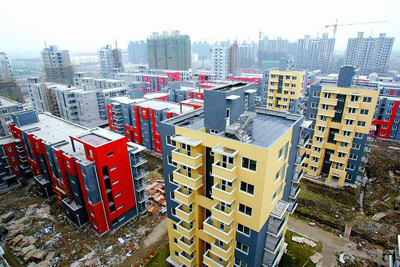Shanghai Daily news

Construction of 10 million square meters of "budget"
apartments priced below 3,500 yuan a square meter will commence this
year.(Photo: www.shanghai.gov.cn)
Shanghai's commercial banks said yesterday they've agreed
to raise interest rates and down payments on speculative home loans and enact
other policies designed to support government efforts to rein in escalating
property prices.
Also yesterday, city housing authorities revealed plans to
build 20 million square meters of apartments for low- and medium-income
residents.
With average residential housing prices soaring 25 percent to
8,756 yuan (US$1,058) a square meter in 2004, Shanghai recently initiated a
series of measures to prevent a speculative property bubble and ensure
affordable housing for its citizens.
In a statement released yesterday by the
Shanghai Banking Association, the city's 16 commercial lenders, including China
Construction Bank and the Industrial and Commercial Bank of China, said they are
raising interest rates and down payment requirements for applicants who already
hold two or more mortgage loans. The figures were not specified.
The banks
have also agreed to stop providing mortgage transfers to people selling their
property within the first year of purchase.
"The new rules are aimed at
fostering the development of a healthy real estate market and housing loan
sector in Shanghai," said the banking association statement.
Most commercial
banks have already started to charge 6.12 percent interest on five-year-plus
mortgage loans for the purchase of a second home, compared with 5.51 percent for
a first mortgage.
China lifted the benchmark rate for mortgage loans with
maturities of more than five years from 5.31 percent to 6.12 percent earlier
this month, following an increase from 5.04 percent to 5.31 percent last
October.
Early this month, the city imposed a 5.5 percent capital gains tax
on properties sold within the first year in another effort to discourage
speculative investment.
But for many local residents, even if the growth in
property values slows, prices are already out of reach.
One of Shanghai's
major goals this year is to create more housing for common wage
earners.
Under the government's blueprint, construction of 10 million square
meters of "budget" apartments priced below 3,500 yuan a square meter will
commence this year.
These homes will be used primarily for families relocated
by urban renewal projects.
The government also plans to begin the
construction of 10 million square meters of even lower priced flats by the end
of the year, according to the blueprint. Buyers will have to satisfy income
requirements to qualify for these units.
"Any steps the government takes to
increase the amount of residential space for mid- to low-end families are
welcome," said Michael Hart, head of research at Jones Lang LaSalle China
(North).
Other real estate experts agreed with the need for a multi-tiered
market.
"Residential housing prices should be differentiated to meet demand
from different income groups," said Lina Wong, managing director of Colliers
International East China, a real estate consulting firm.
But experts said the
government needs to exercise caution as it tries to cool what it considers to be
an overheated market.
"Jones Lang LaSalle's view is that the government can
focus efforts on making the real estate market as fair and transparent as
possible but should allow buyers and sellers to make decisions about what to buy
and where," said Hart.
Shanghai has been taking steps since last year to make
housing sales and project information available online and has already
prosecuted some firms and individuals that abused the system.
"In the end
only the market can regulate itself, and as long as potential buyers and
builders have enough information available to make good decisions, the property
market will be a healthy one," said the researcher.



